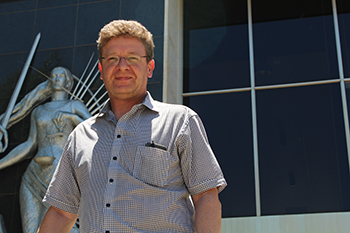Latest News Archive
Please select Category, Year, and then Month to display items
27 October 2025
|
Story Sefako Mokhosoa
|
Photo Supplied
 Ten Grade 12 learners from Mampoi Secondary School in Phuthaditjhaba.
Ten Grade 12 learners from Mampoi Secondary School in Phuthaditjhaba.
On 1 October 2025, the Projects and Innovation Directorate in the Faculty of Education at the University of the Free State (UFS) proudly hosted a certificate ceremony to honour ten Grade 12 learners from Mampoi Secondary School in Phuthaditjhaba on the Qwaqwa Campus. These learners completed a Skills Development Initiative and Workshop Series focused on digital literacy and ICT skills – a programme designed to equip rural youth with the tools they need to thrive in a digital world.
The initiative, which ran from May to August 2025, was made possible through a strategic partnership with BANKSETA to bridge the digital divide in rural communities. The learners received hands-on training in essential digital tools. Each learner also received a tablet to support continued learning and personal growth beyond the classroom.
The Director of the office in the Faculty of Education, Dr Kwazi Magwenzi, stressed that digital skills promote independence and self-directed learning. “Grade 12 is a time when learners should manage their studies, meet deadlines, and explore their options,” she said. “Digital fluency supports that autonomy. It enables learners to use online research, interactive tools, e-learning, and collaboration platforms to make learning more effective, flexible, and aligned with their pace and style. In Grade 12, where the stakes are high – with exams, tertiary entrance, and career choices – this ability helps learners become more self-directed, confident, and equipped.”
The programme not only built learners’ confidence in using ICT tools for learning and communication but also prepared them for the technologically driven environments they will encounter in institutions of higher learning.
Beyond developing digital skills, the project offered learners valuable exposure to the university environment, as their training took place on campus. Inspired by the success of this pilot, the Faculty of Education now aims to expand the initiative to reach more schools and learners across the region. The vision is to scale up access to digital education and empower more young people in rural areas with the skills necessary for academic and professional success.
This ceremony marked the conclusion of a successful training programme and the beginning of a long-term commitment to digital empowerment and lifelong learning in rural communities.
Freedom of religion, a constitutional right and area of global concern
2017-01-17

Prof Shaun de Freitas
Photo: Mamosa Makaya
Freedom of religion is enshrined in the South African Constitution, states that everyone has the right to freedom of religion, which more specifically entails the freedom of conscience, religion, thought, belief and opinion. It makes provision for the protection of religious communities in South Africa. Consequently, the maintenance and protection of such a right is of fundamental importance.
Prof Shaun de Freitas, Associate Professor of Law at the University of the Free State (UFS) specialises in constitutional law, with a specific focus on the right to freedom of religion, and has produced several publications in the field. The latest is titled “Transcending the Private-Public School Divide in the Context of the Right to Freedom of Religion in South Africa”, Chapter 19, in Religious Freedom and Religious Pluralism in Africa – Prospects and Limitations published by Stellenbosch University in 2016.
Prejudice a challenge in all societies
There are numerous challenges faced by religious groups around the world concerning prejudice, association with terrorism and political power and influence. Therefore, research in this field becomes important in helping to uphold the rights and freedoms of religious minority groups, to be able to foster understanding between communities.
Balancing responsibility and religious rights
His current focus is on challenges that have arisen in South Africa, more specifically pertaining to the right of medical practitioners to object conscientiously towards participating in certain medical procedures, the parameters of freedom related to religious associations and the inclusion of religious expression in public schools. These matters are also relevant to many other parts of the world (including, ironically enough, those democratic societies that endeavour to make diversity flourish).